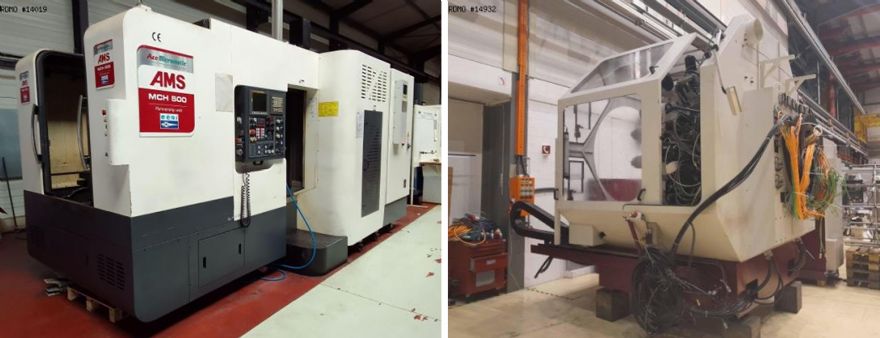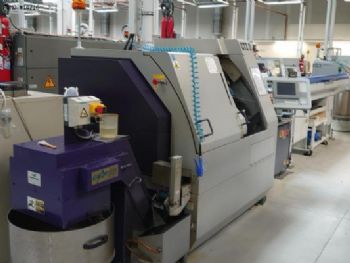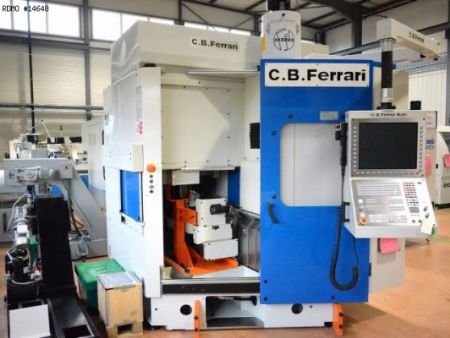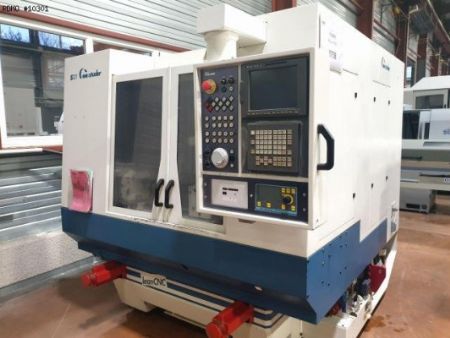
The economic and environmental benefits of purchasing second-hand machine tools have become a central topic in industrial sectors worldwide. Companies across industries are now seeking solutions that not only optimise operational costs but also align with sustainable practices. This shift has positioned second-hand machinery as a practical and eco-friendly alternative. A leader in this field, RDMO specialises in buying and selling used machine tools in areas like turning, milling, grinding, and robotics.
Economic advantages of second-hand machine toolsInvesting in second-hand machine tools offers unparalleled economic benefits for businesses of all sizes. One of the many advantages is the significant cost savings compared to purchasing new equipment. New machines often come with a hefty price tag that can be a major burden for small and medium-size enterprises in particular. In contrast, pre-owned machinery allows companies to access high-quality equipment at a fraction of the cost, freeing up capital for other critical investments.

Another key financial benefit is the reduced depreciation rate of second-hand machines. Unlike new equipment, which can lose a significant portion of its value within the first year, used machines maintain their value more steadily. This translates into higher returns on investment (ROI) over time. Additionally, second-hand tools are often readily available, eliminating the long lead times associated with manufacturing and delivery of new machinery.
RDMO says: “Investing in second-hand machines offers businesses the rare opportunity to reduce costs while maintaining operational excellence.” For businesses, the economic benefits extend beyond initial savings. The availability of tested, reliable machines means less downtime and fewer risks associated with new, untested technology. This reliability ensures smooth operations and helps companies meet their production targets efficiently.
The environmental impact of second-hand machinesThe environmental benefits of purchasing second-hand machine tools are just as compelling as the economic ones. Manufacturing new machinery requires extensive resources, including raw materials such as steel and aluminum, and produces substantial carbon emissions. By choosing used equipment, businesses contribute to a circular economy, where resources are reused and waste is minimised.
Extending the lifecycle of machinery helps to significantly reduce industrial waste. Every machine that is reused means fewer materials are discarded into landfills, and fewer new machines need to be produced. This not only conserves valuable resources but also reduces the environmental footprint of the manufacturing sector.

Second-hand machines also play a crucial role in lowering the overall carbon footprint of industries. The production of new equipment involves high energy consumption and emissions. By opting for pre-owned tools, businesses bypass this energy-intensive process, making their operations more sustainable.
In addition, second-hand machinery reduces the demand for mining and extraction of raw materials. This alleviates the environmental damage caused by mining activities, including deforestation, soil erosion, and water pollution. As industries become more aware of their environmental responsibilities, second-hand machinery provides an actionable way to align with green initiatives.
Why RDMO is a leader in second-hand machine toolsRDMO Specialises in sectors such as turning, milling, grinding, and robotics, and the company offers an extensive inventory of high-quality used machines tailored to diverse industrial needs. Furthermore, its expertise and dedication to customer satisfaction have made it a trusted partner for businesses seeking reliable equipment.
A key advantage of working with RDMO is its meticulous quality assurance process. Each machine is thoroughly inspected and tested to ensure it meets industry standards and customer expectations. The company says that this level of care provides buyers with peace of mind, knowing that they are investing in dependable tools.
Additionally, RDMO stands out for its commitment to sustainability. By facilitating the re-use of industrial machinery, the company actively contributes to reducing waste and promoting eco-friendly practices. Their comprehensive service, which includes consultation, delivery, and after-sales support, ensures that customers receive the best value from their investments.
The company’s expertise and reputation are reflected in their extensive online catalog. Businesses can explore their offerings through platforms like
www.rdmo.com, making it easier than ever to find the right machine for their operations.
Sustainable and cost-effective solutionsThe growing popularity of second-hand machinery is a testament to shifting industry trends. As companies seek sustainable and cost-effective solutions, the demand for refurbished and pre-owned equipment continues to rise. Advances in refurbishing technology have further enhanced the appeal of second-hand machines, ensuring they meet modern production standards.
One notable trend is the increased adoption of automation in second-hand equipment. Machines equipped with robotics and advanced software are now readily available in the pre-owned market, enabling businesses to stay competitive without over-extending their budgets.

Another emerging trend is the integration of data-driven solutions in used machinery. Predictive maintenance and IoT (Internet of Things) capabilities are being incorporated into refurbished machines, allowing businesses to optimise their operations and reduce maintenance costs.
Industries are also embracing second-hand machinery as a way to navigate supply chain challenges. The availability of pre-owned tools reduces dependency on new manufacturing cycles, which can be delayed by global disruptions.
The economic and environmental benefits of purchasing second-hand machine tools make them an ideal choice for businesses aiming to combine cost efficiency with sustainability. By opting for used equipment, companies can reduce their expenses, lower their carbon footprint, and contribute to a greener future. Leaders like RDMO continue to drive this movement, offering high-quality machinery and expert services that meet the evolving needs of modern industries.
The shift toward second-hand tools is not just a trend — it is a strategic move that aligns with the demands of today’s economic and environmental landscape. Businesses that embrace this approach are poised to achieve long-term success while making a positive impact on the planet.